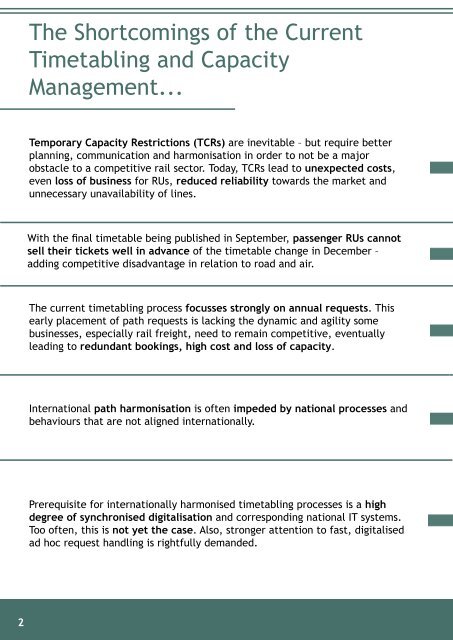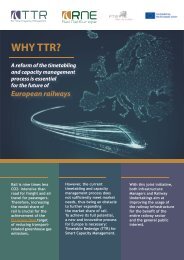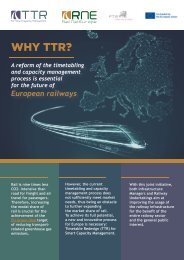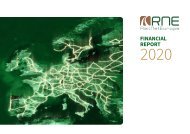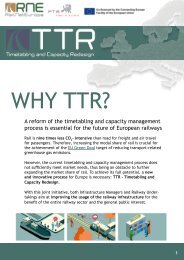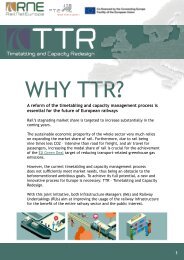TTR_Extended_Brochure_final_UPDATE_FEB
Create successful ePaper yourself
Turn your PDF publications into a flip-book with our unique Google optimized e-Paper software.
The Shortcomings of the Current<br />
Timetabling and Capacity<br />
Management...<br />
Temporary Capacity Restrictions (TCRs) are inevitable – but require better<br />
planning, communication and harmonisation in order to not be a major<br />
obstacle to a competitive rail sector. Today, TCRs lead to unexpected costs,<br />
even loss of business for RUs, reduced reliability towards the market and<br />
unnecessary unavailability of lines.<br />
With the <strong>final</strong> timetable being published in September, passenger RUs cannot<br />
sell their tickets well in advance of the timetable change in December –<br />
adding competitive disadvantage in relation to road and air.<br />
… And How <strong>TTR</strong> Will Overcome Them<br />
With the Capacity Strategy and a Capacity Model, IMs allocate capacity to<br />
various needs (freight, passengers, TCRs) from the beginning. These deliverables<br />
contribute to safeguarding commercial capacity of good quality,<br />
in particular for long distance traffic. On top of that, with improved RU<br />
consultation, the needed clustering of TCRs by their impact, and last but not<br />
least, the TCR Tool for optimised communication and planning, <strong>TTR</strong> provides<br />
solutions for an internationally coordinated approach to minimise negative<br />
impacts.<br />
Through advanced planning with Capacity Models, leading to an acceleration<br />
of the allocation process, passenger RUs can sell their tickets several months<br />
in advance, thus becoming more competitive.<br />
The current timetabling process focusses strongly on annual requests. This<br />
early placement of path requests is lacking the dynamic and agility some<br />
businesses, especially rail freight, need to remain competitive, eventually<br />
leading to redundant bookings, high cost and loss of capacity.<br />
Differentiated timetabling products – several of which will build on<br />
safeguarded capacity – will serve the diverse market needs: annual timetable<br />
requests will be complemented by possibilities to request capacities shortly<br />
before the train run through high-quality, nationally and internationally<br />
harmonised capacity products.<br />
International path harmonisation is often impeded by national processes and<br />
behaviours that are not aligned internationally.<br />
<strong>TTR</strong> stands for the Europe-wide and cross-border harmonisation of all<br />
relevant timetabling processes to facilitate international rail traffic and make<br />
work easier for both Infrastructure Managers and Railway Undertakings. Specifically,<br />
a common IT infrastructure and the adaptation of a <strong>TTR</strong>-supportive<br />
legal framework will be key.<br />
Prerequisite for internationally harmonised timetabling processes is a high<br />
degree of synchronised digitalisation and corresponding national IT systems.<br />
Too often, this is not yet the case. Also, stronger attention to fast, digitalised<br />
ad hoc request handling is rightfully demanded.<br />
The <strong>TTR</strong> IT Landscape will connect a multitude of national IT systems to a<br />
central business layer, thus ensuring compatibility. It will allow quick communication<br />
and enable easier amendments – no matter the type of traffic,<br />
domestic or international, passenger or freight.<br />
Lead times should be minimised for ad hoc requests (i.e. requests placed<br />
less than two months before the beginning of the timetable change or placed<br />
during the current timetable) - for example through automated handling. The<br />
standing of railways in competition with other modes of transport will benefit<br />
of such developments.<br />
2<br />
3


